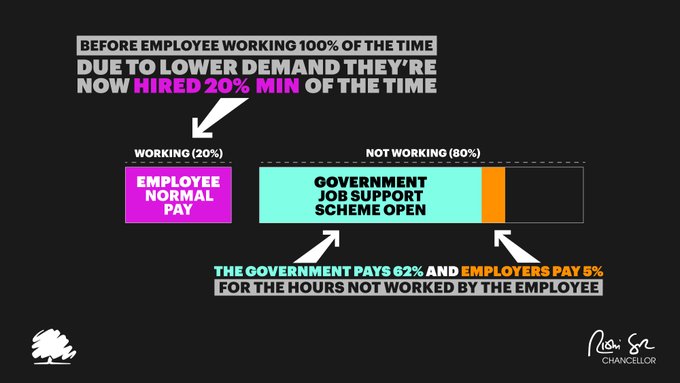To address what many organisations saw as significant problems with the government's previous package of support, the Chancellor has made three main announcements today:
- Amendments to the Job Support Scheme (JSS);
- A more generous grant for organisations affected by the new tiered system of restrictions;
- Additional support for the self-employed.
Improved Job Support Scheme
The most relevant announcement for the charity sector are the changes to the JSS, which will still come into effect on 1 November, with employees still being paid two-thirds of their usual salary.
However, rather than employers paying two-thirds of their employees’ wages, the employer contribution is now only 5%, with government providing up to 61.67% of wages for hours not worked, up to £1541.75, which is more than double the £697.92 that would have been payable under the previous rules.
Additionally, employees will now only need to work a minimum of 20% of their normal hours (one day a week for someone full-time), as opposed to the 33% previously. Employers will still receive the Job Retention Bonus as previously.
This example from Gov.uk helps to clarify what the changes mean in practice:
“Example: a typical full-time employee in the hospitality industry is paid an average of £1,100 per month. Under the Jobs Support Scheme for open businesses, they will still take home at least £807 a month. All the employer needs to pay is a total of £283 a month or just £70 a week; the government will pay the rest.”
This graphic from HMT is also a useful summary of the new rules:

On the face of it, these amendments fundamentally change the incentives for charities to keep people employed, and importantly, it provides more money for charities that would otherwise struggle to pay people under the old version of this scheme.
This still may leave gaps, however, particularly for those charities and other organisations that, while not forced to close, will see activities severely restricted due to distancing rules. It’s likely that some will struggle to afford retaining workers for a minimum of 20% of their time.
It is, however, very encouraging to see the government respond and act on concerns and make the necessary changes for the scheme work for organisations, including charities, that are under considerable financial pressure.
Business Grants
The Chancellor has announced additional funding of up to £2,100 per month for business in hospitality, accommodation (hotels and B&Bs), and leisure who will be affected by the restrictions put in place by restrictions in high-levels areas (Tier 2) i.e. those which are not legally forced to close, but who will be severely impacted by social distancing rules. They will also be available retrospectively for areas already under these restrictions (e.g. Liverpool).
This grant funding will be based on the number of hospitality, hotel, Bed & Breakfasts and Leisure businesses in the area. It will be interesting to see how ‘Leisure Business’ is defined. We would hope that it will include community leisure organisations which are charitable trusts.
Local authorities will receive funding to the equivalent of:
- For properties with a rateable value of £15,000 or under, grants of £934 per month.
- For properties with a rateable value of between £15,000-£51,000, grants of £1,400 per month.
- For properties with a rateable value of £51,000, grants of £2,100 per month.
An important part of the announcement is that local authorities will determine who is eligible for this grant funding, with the bullet points above only as an ‘approximate guide’ as to how the funding should be allocated. It will be interesting to see how local authorities determine who will receive this funding, and by which criteria. We recommend contacting your local authority to see if you are eligible for these grants.
Self-Employed
The final announcement concerned the Self-Employed, increasing the amount of profits covered by the forthcoming SEISS grants from 20% to 40%, so the maximum grant will increase from £1,875 to £3,750. Due to the nature of the charity labour force, we suspect these changes will not have too great an effect, but for those who are interested, there are more details here.
Additional thoughts
As already outlined, there is much to praise from the latest set of announcements from the Chancellor, and many of the changes will make schemes which were previously of limited benefit, fit for purpose.
But it is important to note that the changes announced today will not alleviate the financial burden that so many charities are facing. If the government wants to see charities avoid mass redundancies and continue to play their rightful role in helping support disadvantaged communities throughout the difficult winter months, additional support is much need, and sooner rather than later.
« Back to all news